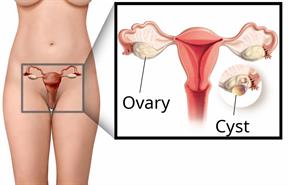Ovarian Cyst

An ovarian cyst is a fluid-filled sac that forms on an ovary. The ovaries are small organs that produce eggs in females. Many types of cysts can form on the ovaries. Most of these cysts go away on their own and are not cancer. Some cysts need treatment.
What are the causes?
Ovarian cysts may be caused by:
Chemical or hormone changes in your body during your normal monthly period.
Polycystic ovarian syndrome (PCOS). This is a common problem of the hormones.
Endometriosis. The tissue that lines the inside of the uterus grows outside of the uterus. If it grows on your ovaries, it can form cysts.
Pregnancy. Your body makes more hormones than normal to support the pregnancy. This can form cysts.
Infection. Infection in your uterus can spread to your ovaries and can form cysts.
What increases the risk?
You are more likely to get this condition if:
What are the signs or symptoms?
Many ovarian cysts do not cause symptoms. If you have symptoms, they may include:
Pain or pressure around the pelvis. The pelvis is the area between the hip bones.
Pain in the lower belly.
Pain during sex.
Swelling in the lower belly.
Periods that don't come at the same time each month.
Pain during a period.
How is this diagnosed?
These cysts are found during a routine exam of the pelvis. You may have other tests to find out more about the cysts. Tests include ultrasound, CT scan, MRI, and blood tests.
How is this treated?
Many ovarian cysts go away on their own without treatment. When treatment is needed, it may include:
Medicines to help treat pain.
A procedure to drain the cyst.
Surgery to take out the cyst.
Hormones or birth control pills.
Surgery to take out the ovary.
Follow these instructions at home:
-
Take all medicines only as told by your health care provider.
-
If told, get Pap tests and regular exams of the pelvis.
-
Do not smoke, vape, or use nicotine or tobacco.
-
Return to your normal activities when your provider says that it's safe.
- Keep all follow-up visits. Your provider may want to check your cyst for 2–3 months to see if it changes.
Contact a health care provider if:
-
You have really bad pain in the belly or pelvis, and the pain comes on all of a sudden.
-
You have heavy bleeding that soaks through more than one pad every hour.
This information is not intended to replace advice given to you by your health care provider. Make sure you discuss any questions you have with your health care provider.
